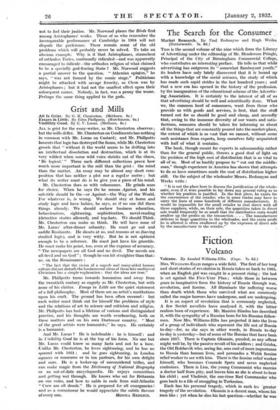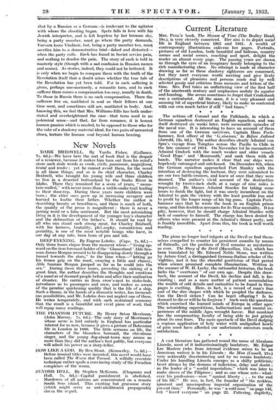Fiction
Volcano
Volcano. By Amabel Williams-Ellis. (Cape. 7s. 6d.) Mies. WiLirasis-Erris ranges a wide field. The first of her long and short stories of revolution in Russia takes us back to 1905, when an English girl was caught in a peasant rising ; the last is set against the Five-Year Plan ; while those in between trace in imaginative form the history of Russia through war, revolution, and famine. All illuminate the suffering worse than death which those who survived what are commonly called the major horrors have undergone, and are undergoing.
It is an aspect of revolution that is commonly neglected, A few Soviet novelists have analysed it, with the bitter realism born of experience. Mr. Maurice Hindus has described it, with the sympathy of a Russian born for his Russian fellow- men. Now Mrs. Williams-Ellis has projected it into the lives of a group of individuals who represent the life not of Russia to-day—for, as she says in other words, in Russia to-day to-day is yesterday—but of some of the Bussias that have been since 1917. There is Captain Oksanin, puzzled, as any officer might well be, by the passive revolt of his soldiers ; and Grisha, the Old Bolshevik who, seeing far, sees coal of more importance to Russia than human lives, and persuades a Welsh famine relief worker to see with him. There is the famine relief worker himself, who becomes Comrade Spetz and saves neglected coalmines. There is Lisa, the young Communist who marries a doctor half from pity, and leaves him as she is about to bear his child ; and Vladimir, the one-time Red Commander who goes back to a life of smuggling in Turkestan.
Raeh has his personal tragedy, which in each is s "greater tragedy of the revolution. Oksanhi is a decent man, whom his men like : yet when he dies his last question—whether he was shot by a Russian or a German--is irrelevant to the agitator with whom the shooting began. Spetz falls in love with his Jewish interpreter, and is left hopeless by her because she, being a party member, must go where the party demands.. Varvara loves Vladimir, but, being a party member too, must sacrifice him to a demonstrative trial—faked and distorted—. when the party calls. Each has found in Soviet service pain, and nothing to deaden the pain. The story of each is told in. masterly style (though with a sad confusion in Russian names and nouns). As stories, indeed, they could not be bettered. It is only when we begin to compare them with the truth of the Involution itself that a doubt arises whether the true tale of the. Revolution has yet been told. Far in each suffering is given, perhaps unconsciously, a romantic turn, and to each sufferer there comes a compensation too easy, usually in death. To those in Russia there is no such compensation. There the sufferers live on, mutilated in soul as their fellows at one time were, and sometimes still are, mutilated in body. And, knowing this, we feel that Mrs. Williams-Ellis has both under- stated and overheightened the case—that term used in no polemical sense—and that, fur from romance, it is honest human passion which is needed, to be opposed to those who for the sake of a shadowy material ideal, for two pairs of unwanted shoes, torture the human soul beyond human bearing.







































 Previous page
Previous page